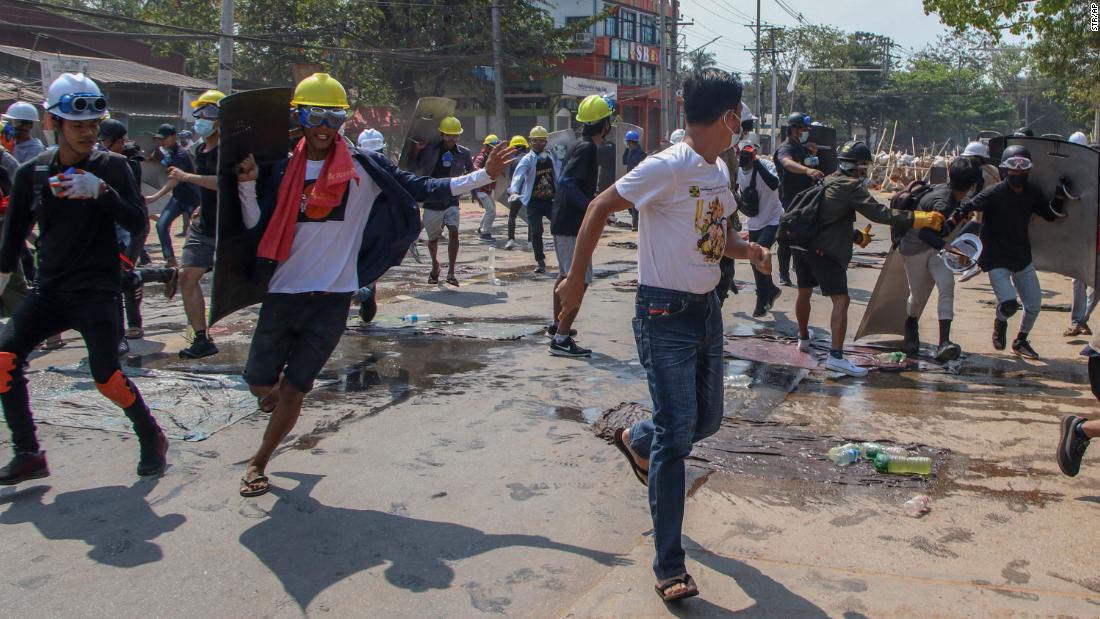In an unverified graphic image, a body can be seen with a shattered head and brain remains scattered on the road.
“He said it was worth dying for,” she said. “He is concerned that people will not participate in the protest. In that case, democracy will not return to the country.”
More than 2,000 people have been arbitrarily detained since the coup, according to the AAPP, many of them kept out of contact with family and friends, their conditions or whereabouts are unknown.
CNN cannot independently verify the numbers of the arrests or the death toll of the AAPP.
Myanmar’s state-run daily newspaper issued a warning on Wednesday reinforcing the military’s narrative that they are using minimal force against protesters.
On Thursday, the UN special rapporteur on human rights in Myanmar, Tom Andrews, said in a statement to the UN Human Rights Council in Geneva that an “increasing number of reports” indicates that the junta’s security forces are committing “acts of murder, imprisonment, harassment and other crimes within the framework of a coordinated campaign, directed against a civilian population, in a generalized and systematic manner, with the knowledge of the leadership of the junta.”
The “brutal response”, he said, “therefore, is probably reaching the legal limit for crimes against humanity”.
He called on UN member states to stop the flow of revenue and weapons to the junta, saying that multilateral sanctions “should be imposed” on leaders, military-owned and controlled companies and the state-owned energy company, Myanmar Oil and Gas Enterprise.
His statement came after the human rights group Amnesty International released a report saying that the military was embarking on a “killing spree” in Myanmar, using increasingly lethal tactics and weapons normally seen on the battlefield against peaceful protesters and observers.
Upon checking over 50 videos of the ongoing crackdown, the Amnesty Crisis Evidence Laboratory confirmed that security forces appear to be implementing planned and systematic strategies, including intensive use of lethal force, indiscriminate spraying of live ammunition in urban areas and many of the documented murders correspond to extrajudicial executions.
“These Myanmar military tactics are far from new, but their killings have never been broadcast live for the world to see,” said Joanne Mariner, Amnesty International’s crisis response director. “These are not the actions of oppressed and individual officials who make the wrong decisions. These are unrepentant commanders already implicated in crimes against humanity, openly highlighting their troops and murderous methods.
Fleeing to India
There is evidence that violence is forcing people to flee the country. Between 200 and 300 people crossed the border from Myanmar to the state of Mizoram in northeastern India, fleeing the unrest, Mizoram’s chief minister told CNN.
That number includes police, civil servants, their families and other civilians, and the number of people fleeing is increasing daily, according to Chief Minister PU Zoramthanga.
“We (the Mizoram government) are not sending them back from a humanitarian point of view. When someone enters the land, at the border of the country, for fear of their lives, we cannot just send them back. They are not criminals. It is a political issue, “he said.
Zormanthanga added that people receive food and shelter and many have families in Mizoram. He said it was up to the central Indian government to deal with people crossing the border.
Suu Kyi accused of bribery
Military spokesman Brig. General Zaw Min Tun told a news conference that Suu Kyi accepted illegal payments worth $ 600,000, as well as gold, while in government, according to Reuters.
The spokesman added that the information was verified following a complaint from a former Yangon regional minister, and that an anti-corruption committee was investigating.
Suu Kyi’s lawyer Khin Maung Zaw told CNN that “the allegations are a total invention”.
“I have been in politics in Myanmar for almost 40 years and, in all those years, I have not witnessed such shameful accusations,” he said. “We are in a country where people have seen a lot of corruption in the past and a lot of inappropriate behavior, but Aung San Suu Kyi is not in that sphere of corruption.”
He added that although he had “many disagreements” with Suu Kyi, “when it comes to corruption, bribery, greed – this is not her, she is not that type of woman.”
Along with Suu Kyi, deposed President Win Myint, his wife and several ministers were being investigated for allegedly asking for and accepting “money from some businessmen,” the spokesman said, without clarification, according to Reuters.
Suu Kyi and Win Myint remain under house arrest.
The military, led by coup leader Gen. Min Aung Hlaing, took complete control of the country last month, toppling Suu Kyi’s democratically elected government, which had won an overwhelming victory in the November 2020 elections.
The Army justified its action by alleging widespread electoral fraud in that vote – only the second democratic vote since the previous military junta initiated a series of reforms in 2011.
In a video statement transmitted to the UN Human Rights Council, Myanmar Foreign Ministry permanent secretary Chan Aye said: “In recent days, the authorities involved have been paying attention to maintaining law and order in the country. “and” the authorities have been exercising maximum restraint to deal with the violent protests. “
Chan Aye also said that the military leadership remains committed to “free and fair multi-party democratic elections”.
In a statement, China’s ambassador to the UN, Zhang Jun, said that “it is important that the members of the Council speak with one voice. We hope that the Council’s message will help to alleviate the situation in Myanmar.”
Kyaw Moe Tun said the message “does not meet the expectations of the people”, stating that against the brutality of the military “we all feel helpless” and called for the protection of the international community.
CNN’s Sarita Harilela, Vedika Sud, Richard Roth and Radina Gigova contributed reports.
